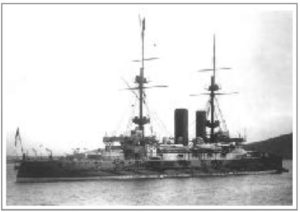Royal Marine Light Infantry – HMS Bulwark

Charles James Brown was born in Gloucester on 20 January 1893, one of five children born to Charles William Brown and his wife Mary Ann.
His mother died in 1905 and young Charles became a domestic servant upon leaving school.
On 2 January 1911 aged just under 18 years old, he enlisted in the Royal Marine Light Infantry.
He underwent basic training at Deal until 8 November 1911 and was then stationed in Portsmouth before joining the ship’s company of HMS Bulwark on 4 June 1912.
Bulwark was a ‘London Class’ pre-dreadnought battleship, commissioned in March 1902 and since 1910 had been in reserve in the Home Fleet. Upon the outbreak of war it became part of 5th Battle Squadron, in the reformed Channel Fleet, based at Portland; the Squadron transferred to Sheerness in Kent on 14 November 1914, when there were concerns regarding a German invasion.On 26 November HMS Bulwark was moored in the Medway estuary about four miles west of Sheerness when at 7.53am a massive explosion blew the ship apart. The Times newspaper reported:
“The band was playing and some of the men were drilling on deck when the explosion occurred. A great sheet of flame and quantities of debris shot upwards and the huge bulk of the vessel lifted and sank, shattered, torn and twisted, with officers and men aboard.“
Rescue efforts were hampered by debris and bodies strewn across the water. It is thought that 788 men lost their lives and there were only a handful of survivors who had by some miracle been blown clear, landing in the water and clinging to floating wreckage.
A naval court of inquiry ruled out enemy action or sabotage and heard that on the morning of the explosion the ship’s six-inch magazines were being re-stowed to keep the cordite charges together.
At least thirty cordite charge packs had been left in the passage ways between the ship’s magazines and when the ship’s company was piped for breakfast at 7.45am, the magazine doors had been left open. Some cordite was stored against one of the boiler room bulkheads, which became increasingly warm as the boilers fired up. The cordite ignited, causing the nearby six-inch and twelve-pounder shells to detonate and the resultant fire spread to the magazines storing the shells for the twelve-inch guns, the detonation of which caused the huge explosion: examination by divers confirmed very little of the ship lay intact.
Private Charles James Brown was one of the unlucky ones to lose his life in the terrible explosion and like most of the ship’s company his remains were never found and he is commemorated on the Portsmouth Naval Memorial.
